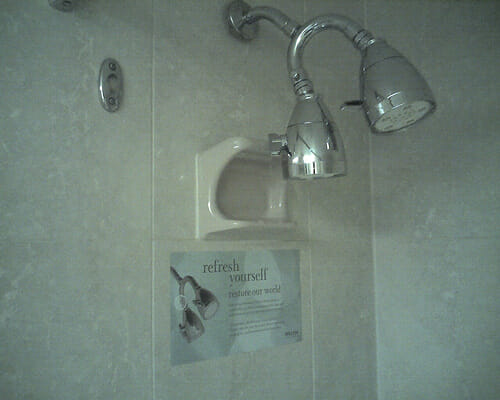Striking a Blow Against the State
Fortunately I am not vain, so that I can still post this terrible picture of myself. I am proudly holding the government-mandated flow restrictor I just removed from my most recent shower head purchase. I don't buy any shower head until I make sure it has a removable restrictor.

The Federal laws restricting shower head flows have got to be among the dumbest on the books. Some thoughts:
- Water is not equally scarce everywhere. So why is everyone required to conserve? Why is the ideal flow rate the same in Seattle as in Phoenix?
- Government policy for over a century has been to promote subsidized water prices that don't reflect its true scarcity (particularly to farmers). Then, having guaranteed overuse via its pricing actions, the government then implements silly laws like this to try to offset the harm from its meddling in prices.
- We have a lawn in Phoenix that needs constant watering and a pool that evaporates so fast in the summer one can almost see the water level dropping. But the state's priority is to knock of a few gallons of water use from my shower.
- With the low flow shower heads, it takes me three times longer to get the soap and shampoo off of me than with a full-flow head. So we cut the water rate by half, but extend shower times by three. And this helps, how? And don't even get me started on low-flow toilets
- The last three hotel rooms I have stayed in have had double shower heads, to make up the lost flow from wimpy government-approved single heads. This process of cutting back on how much a single head can flow and then adding extra heads is incredibly dumb and wasteful.

- I suspect this is all secret revenge from some English expat that wanted US showers to be as bad as those in Britain.
Even sillier, is the fact that industrial and agricultural use of water dwarfs residential use. I read somewhere that residential consumers, consume about 5% of the water in California, the 95% goes mostly to agriculture with some going to industry. I would think if you really wanted to save water in drought stricken CA, one should look at cutting back on rice cultivation, rather than making us all brick our toilets and put restricters in the shower heads.
That doesn't even mention the billions of gallons of water wasted by government, such as California recently did in a vain (multiple meanings apply) attempt to bring back some endangered fish.
I found a document which lists US Use
http://www.cbia.org/go/cbia/?LinkServID=E242764F-88F9-4438-9992948EF86E49EA
47% goes to power plants 34% goes to agriculture 5% is self obtained by industry and 11% is a mix of home use and industrial per the pie chart on page 5.
Really looks to me like saving water from the the small portion of the 11% that can be partially attributed to residential use is wasted compared to savings which could be had trying to cut back a small amount from power plants and agriculture.
http://www.californiawater.org/docs/CIT_AWU_Report_v2.pdf shows US water use on Page 5. 11% is attributed to manufacturing and residential use. Savings efforts could be much better trying to cut back on power generation use, and ag use. (Or just raise prices as Warren suggests)
When planning for future water supplies, especially in areas where new/additional supplies are scarce, it is a tremendous benefit to know how much to plan for because the costs are significant and the lead-time often long.
the other thing to keep in mind is that we're using drinking water for showers. Water is expensive to treat to the level that it is safe to drink and then we use most of it for lesser needs than drinking.
Conserving water is a virtue - no matter where you are because in addition to the water supply issue - if you are using sewer - the volume of water on the sewer system and treatment plant is also significant.
Your use of water can and is reflected in your monthly bill for water/sewer and we often hear people complaining about the cost; that cost is directly connected to your use. No only operational costs but capital costs for future supplies.
agriculture does not use expensive treated drinking water for the most part - you're comparing apples to oranges.
Perhaps we'd do better if govt did not do water and private companies did - and charged accordingly for it. eh?
Right, but I pay for water and sewer services. If sewer costs are so high, then the water utility should be charging me more to cover costs. If water costs are so high for treating, the water company should charge me more for that processing.
If there is a shortage of water, the water company should charge more so we use less. I don't understand cities like Atlanta getting within 80 days of no water without raising the price to get folks to stop using the stuff.
I totally agree and that is a problem with govt run water/sewer - their approach is to require "restrictors" when instead, they should be charging you out the wazoo for any over minimum use.
then you can decide if you want to use a restrictor or not or just pay more for your wanton use.
And in all these cases, if I am charged more for the services, I will find ways to use less of it.
Fight The Power, Baby! we are all Spartacus!
Even worse for rural folks. We pump our water out of the ground, take a shower with it, and put it right back in the ground - virtually 100% recycling.
The only resource used is the electricity to pump it. To be efficient in our electricity usage, we'd like to run our water at relatively low pressure. However, low-flow devices are designed to provide low flow with the MUCH higher typical pressures found in city water systems. At lower pressures, flow rates become laughable.
Therefore, we have to run our system at high pressure, using more electricity. No water savings, wasted electricity. One-size-fits all thinking at its best. Can't wait to see what other wonderful ideas will be imposed on my to improve my life.
A dozen years ago I spent far too much time in hotels on business. I bought a shower-head and a wrench so that I could take a civilized shower in the hotels.
Inquiring minds might wonder what a guy who lives in a desert is doing with a lawn.
that's an amazing aspect of many water systems in the west. They're making precious drinking water from scarce supplies that are subject to drought - and folks are using it for their lawns - and - complaining about low flow restrictors! :-)
If only OP had mentioned that there is a way to solve this dilemma...
Having always had the Mighty Missisp, the Even Mighter Ohio, or the Even Mightier Yet Great Lakes in my back yard, all of this talk of water shortages is very alien to me.
What's the over/under on when the EPA SWAT team raids Warren's house?
re: wells and septic tanks - agree...but anyone who has a well also knows that during droughts - you don't waste it....
re: swat team - it depends on whether or not the lawn sprinklers are running when they come. :-)
Wouldn't worry about his lawn that much, golf courses use something like 1M gallons per day and many aren't set up to use effluent. Also, a grassy lawn reduces temperatures especially at night by several degrees and can reduce your energy usage. Many people have lawns (and pools) in the Phoenix area, water is pretty cheap here.
In Charlotte, they asked users to cut back and when they did, the water dept. raised their rates because people weren't using enough water. Don't kid yourself, they are in the business of selling water. Chicago complained that too many people were drinking bottled water, not using the tap costing them money.
Ever notice it rains and it's called the water cycle.